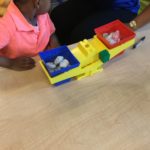Using the Bucket Balance to Reinforce The Concept of “Same”
I like a good old bucket balance in a preschool room. Even though there are all sorts of scales available and they each have their place and their use, the bucket balance engages children in ways that some others might not.
The bucket balance asks children to figure out which side is heavier, which side is lighter, and to consider notions of “more and less.” But perhaps more interesting to the egocentric child, is the way the bucket balance can be used to find the “same” weight.
Why is making the balance even more interesting than the exploration of more and less? Because the young child has an innate interest in issues of fairness and equality. They want to know how power differentials come to be and why some people seem to fit while others don’t. They have a vested interest in why their older siblings get to stay up later than they do and why some kids seem to always push to the front of the line. These are issues of social parity and push them to explore the concept that “fair doesn’t always mean equal.” Making things exactly the same is the ultimate test and one that is difficult to accomplish even for adults.
As children put rocks in one of the buckets in order to get it to balance, they see how difficult it is to make it exactly even. This is especially true when using nonstandard units such as rocks. They work very hard testing and retesting the sides, lining up their faces with the table looking for the smallest discrepancies in the weight distribution.
 Often they have to trade one heavy rock for two smaller rocks. This challenge continues until they are satisfied that it is even and balanced. Try this in your own classroom with rocks or seashells or twigs and see what happens.
Often they have to trade one heavy rock for two smaller rocks. This challenge continues until they are satisfied that it is even and balanced. Try this in your own classroom with rocks or seashells or twigs and see what happens.
I like how this activity challenges children because of their perception.